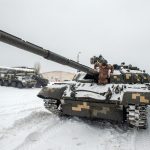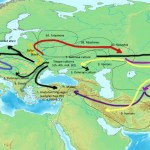Prime
 Russian Generals: Yeah, We Meant to Do That
Russian Generals: Yeah, We Meant to Do That 
We have a bit more detail now on that Russian General Staff update in which they seem to argue that most of their military operation in Ukraine is now done and they’re going to focus just on “liberating” Donbas, the region in the east of the country, part of which had been under de facto Russian occupation back to 2014. Christopher Miller of Buzzfeed gives us a bit more of the nuance and detail.
Read More Cutting Their Losses?
Cutting Their Losses? 
The Russian Ministry of Defense just announced that, in Reuters’ wording, the “first phase of its military operation in Ukraine was mostly complete and that it would focus” on “liberating” (Russia’s word) the Donbas region in Ukraine’s east. It’s hard to know precisely what this means. It could mean close to nothing and in fact things continue as they have for weeks with no clear change. But it could also mean admitting that most of the military operation in Ukraine has failed or met much more resistance than was anticipated and they are now focusing on cleaving off a large chunk of territory in the east.
Read More An Interesting, Troubling Article
An Interesting, Troubling Article 
Last night TPM Reader ES sent me this Newsweek article on the Ukraine War that he was puzzling about. I read it and found it quite interesting. Let me premise this by anticipating some responses. Yes, Newsweek is trash. By any fair standard the Newsweek most of us grew up with doesn’t exist anymore. The magazine or rather the title is now owned and operated by yet another rightwing cult – the kind that always seems interested in buying publications. So yes, Newsweek is trash. But I decided to read it because I noticed the byline: William Arkin. Arkin is not trash. He’s a longtime national security reporter with a good, if perhaps idiosyncratic, reputation. I note all this simply to say that you shouldn’t dismiss it because of Newsweek’s current and deserved reputation.
Read More Keep An Eye on This
Keep An Eye on This 
I don’t want to get too deep into particular reports. But both Ukrainian government sources in Kyiv as well as reporters on the ground in contested areas are reporting that the Ukrainian Army is having some success reclaiming territory around Kyiv over the last 24 to 48 hours. (Peruse my Ukraine Crisis and Military Analysts lists to get more granular details.) I wouldn’t put too much into these reports as yet since both propaganda and the fog of war make our visibility blurry at best. (I find it impossible to know what to make of claims like this, for instance.) And even the reported gains are fairly small. But this does seem to be happening. And it matches reports of real though not game-changing counteroffensives and reclaiming of territory in other parts of the country. There’s been an assumption that these fronts are basically stalemated or that the Ukrainian Army’s size and armament is really suited only to defensive operations. But it’s not clear that is the case.
Read More The Heady Call of Triumphal Maximalism
The Heady Call of Triumphal Maximalism 
Eliot Cohen is a commentator on military affairs who’s been a fixture of Washington’s conversations for decades. He’s generally been in line with the policy hands identified as “neocons” but his writing has never been entirely in line with theirs. It’s at least a bit more independent, a bit less infected with their antic zeal. Earlier this month Cohen wrote a short article for The Atlantic titled “The Strategy That Can Defeat Putin.” It’s essentially a neo-Cold War manifesto which calls for a military crusade against the kind of revanchist authoritarianism which Vladimir Putin’s Russia both embodies and leads. Cohen writes that Putin’s invasion of Ukraine “is a threat, too, to the integrity and self-confidence of the world’s liberal democracies, battered as they have been by internal disputes and backsliding abroad.” He argues that the goal of U.S./EU/NATO policy must be not only to defend the territorial integrity of Ukraine but “to leave Russia profoundly weakened and militarily crippled, incapable of renewing such an onslaught, isolated and internally divided until the point that an aging autocrat falls from power. Targeting Putin alone is not enough.”
Read More
A few of you asked for book recommendations to read more on the subject of my post this morning about Ukraine and the homeland of the speakers of proto-Indo-European, the ancestor language to the languages spoken by just under half the world’s population. There’s a long answer and a short answer. But the short answer is the better one. The book is The Horse, the Wheel, and Language: How Bronze-Age Riders from the Eurasian Steppes Shaped the Modern World by David W. Anthony.
Read MoreThis is hard to make sense of. But let me give you a brief update. A short time ago the Russian paper Komsomolskaya Pravda published an article which cited official Russian military numbers of killed in action in Ukraine as 9,861. That is a mind-blowing number. In one month Russia would have lost 2/3rds of the soldiers it lost in a decade in Afghanistan. But then a very short time later the article was pulled and replaced by a 404 error. Then it was reposted without any numbers.
What lends some credibility to these numbers is that that is in the ballpark of many Western estimates for Russian fatalities. I’ve been watching expert Russia watchers debate this in real time on Twitter and they seem to disagree on whether this was a real number that was rapidly pulled or whether it was just a complete goof, a typo.
 Digging Into the Archeology of Language
Digging Into the Archeology of Language 
From the outset of the Ukraine Crisis, Ukraine’s relationship with Europe and potential integration into Europe via the European Union has been a, perhaps the, cornerstone issue. I got to thinking about this over the weekend since almost every European language originated in the country we now call Ukraine. Don’t get me wrong. I don’t argue that what I’m describing has any particular relevance to the current crisis. But it’s a fascinating prism through which we can look at our connections to the distant past. The language which I am now writing and which you are now reading originated on the steppeland just north of the Black Sea and the Caspian Sea. In other words, in the region we now call Ukraine and some adjoining parts of Russia and perhaps Romania. This is true of English — a loose hodgepodge language — but not only English. All European languages except Finnish, Estonian, Hungarian and Basque start there. (Maltese, an official EU language, is derived from Arabic, a Semitic language. Turkish is an Altaic language so it depends what you count as “Europe.”) And not just Europe. This is also the origin point for the languages of Iran, much of Central Asia and northern India (including Hindi and Urdu). This is not to mention the Spanish, Portuguese and French that are spoken in the Western Hemisphere outside of Anglophone Canada and the United States.
Read More
I mentioned last week that a significant part of high energy prices which have fueled inflation have been driven by the refusal of Saudi Arabia and other Gulf monarchies to increase supply and moderate prices. As we discussed last week, the de facto ruler of Saudi Arabia, Mohammed bin Salman, has been fairly open about the fact that he sees no urgency about cooling oil prices as long as the U.S. government has not provided him with immunity for the murder of Jamal Khashoggi or total support for its war in Yemen.
Just this morning, the Saudi Foreign Ministry put out more of what amount to threats if the U.S. doesn’t back its war in Yemen. From Al Arabiya …
Read More
I mentioned a few days ago that one of the most promising innovations of the COVID pandemic in the U.S. is the use of wastewater analysis to predict the ebbs and flows of pandemic waves. The technology isn’t new — it’s just testing sewage water. It’s not that no one had thought about it or done it before. But the society-wide crisis of the COVID pandemic has demonstrated its utility and potential in dramatically new ways. So two thoughts: We’ve seen the potential of these approaches already. Mandates and other interventions are now maniacally polarized. But the federal government should be using this strategy to create a simple and easy to understand forecasts of COVID prevalence. I knew that cases were likely to rise a week ago because I follow wastewater analysis trends and also follow patterns around the world. But it shouldn’t be that hard. It should be available in something like a weather forecast, done in a systematic fashion, made available to the public through all the logical channels. It could and should be like weather reports or the daily and weekly allergy forecasts you can find online.
Read More